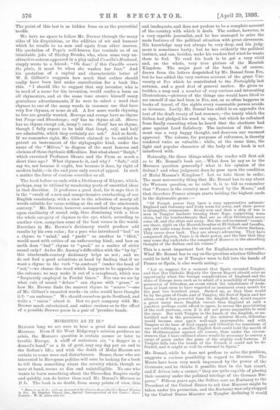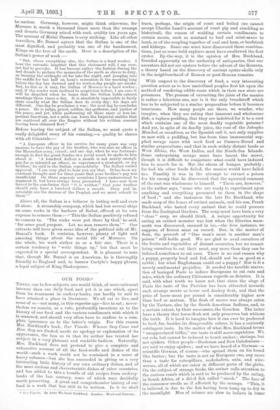MOROCCO AS IT IS.* BEFORE long we are sure to
hear a great deal more about Morocco. Even if Sir West Ridgeway's mission produces no crisis, the Morocco question is certain sooner or later to trouble Europe. A whiff of malarious air, "a dagger in a damsel's hand," or a fit of gout, may any day put an end to the Sultan's life ; and with the death of Mulai Hassan are certain to come wars and disturbances. Hence, those who are interested in European politics will soon be looking for a book to tell them something about the country which, though so near at hand, seems so dim and unintelligible. No one who wants to learn something about the Shereefian Empire easily and quickly, can do better than read Mr. Bonsai's Morocco as It Is. The book is no doubt, from many points of view, thin
• Moro Ico as It Is; with an Account of Sir Chalice an-Smith's &oast Mission to Fee. By Stephen Bonsai, jun., Special Correspondent of the Central News. London : W. H. Allen and Co.
and inadequate, and does not profess to be a complete account of the country with which it deals. The author, however, is a very capable journalist, and he has managed to seize the main features of the political situation with great cleverness.
His knowledge may not always be very deep, and his judg- ment is sometimes hasty; but he has evidently the political instinct, and can, besides, make his readers feel what he wants them to feel. To read his book is to get a very vivid. and, on the whole, very true picture of the Moorish Kingdom. The major part of the book is, of course, drawn from the letters despatched by Mr. Bonsai from Fez, but he has added the very curious account of the great Uni- versity at Fez which he contributed to the Fortnightly last autumn, and a good deal of general matter. He gives us besides, a map and a number of very curious and interesting
illustrations,—pictures of the things one would have liked to see oneself if one had been in Fez, not, as so often happens in books of travel, of the sights every reasonable person avoids as tiresome. Lastly, Mr. Bonsai has added in an appendix the
text of the draft treaty of last summer,—the treaty which the Sultan had pledged his word to sign, but which he refrained from finally executing when he heard that the elections had gone against Lord Salisbury. The inclusion of this docu- ment was a very happy thought, and deserves our warmest approval. The volume, for purposes of reference, is thereby rendered twice as valuable ; while, at the same time, the light and popular character of the body of the book is not interfered with.
Naturally, the three things which the reader will first ask as to Mr. Bonsai's book are, —What does he say as to the Morocco question generally P what is his opinion of the Sultan P and what judgment does he pass upon the condition of Mulai Hassan's Kingdom ? Let us take these in order. The most noteworthy thing that Mr. Bonsai has to say about the Western question, as he calls it, is to bid us remember that " France is the country most feared by the Moors," and that therefore France always starts holding the highest cards in the diplomatic game :—
" Of French power they have a very appreciative estimate. England and Germany and Italy seem far away, and their power is intangible, evanescent. Every now and then a ship of war is seen in Tangier harbour bearing their flags, supporting some claim, but the bombardments that are so often threatened never come off, and the ships sail away. But the red-trousered roumis ' are there, right on the Moorish frontier at El-Goleah and Insuffra, only 200 miles away from the sacred mosque of Western Barbary. They never draw back. They are always advancing. They have conquered Algeria, Tunis is in their power, and the fear that they may some day undertake the conquest of Morocco is the absorbing thought of the Sultan and his viziers."
This is a most important fact for Englishmen to remember. What Mr. Bonsai has to say on the question whether Gibraltar could be held by us if Tangier were to fall into the hands of France or Spain, is also worth noting :-
"Let us suppose for a moment that Spain occupied Tangier, and that Her Catholic Majesty the Queen Regent should seize an opportunity when the foreign complications of England and the state of Europe were such as to admit of a possibility of regaining possession of Gibraltar, an event which the inhabitants of Anda- lusia at least seem to have regarded as imminent every month for the past two hundred years. Backed up, as they then would be by the guns of Ceuta and of Tangier, the fleet of Spain and her allies, even if less powerful than the English fleet, would require a great many more English vessels than England at such a junction perhaps could afford to spare, to secure the provisioning of the rock garrison, even if it did not prove impossible to raise the siege. But with Tangier in the hands of the English, or un- fortified and in the possession of the indolent Moors, Gibraltar would become once aga,'n well-nigh impregnable, and with Tangier as its base of food supply and Gibraltar for munitions of war and refitting, a smaller English fleet could hold the month of the Mediterranean against all corners, than under the circum- stances that I have outlined above would be necessary to convoy a cargo of grain under the guns of the mighty rock fortress. If Tangier falls into the hands of the French it could not be de- fended, and it might as well be returned to Spain."
Mr. Bonsai, while he does not profess to solve the problem, suggests a curious possibility in regard to Morocco. The Moors have been very much impressed by the power of the Germans, and he thinks it possible that in the last resort, and if driven into a corner," they are quite capable of placing their country under the political tutelage of the German Em- peror." Fifteen years ago, the Sultan sent an Embassy to the President of the United States to ask that Moromo might be taken under his protection, and the Embassy was only stopped by the United States Minister at Tangier declaring it would
be useless. Germany, however, might think otherwise, for Morocco is worth a thousand times more than the swamps and deserts Germany seized with such avidity ten years ago. The account of Mulai Hassan is very striking. Like all other travellers, Mr. Bonsai agrees that the Sultan is one of the most dignified, and probably was one of the handsomest, Kings on the face of the earth. Here is a description of the Sultan's power of work .- " But, above everything else, the Sultan is a hard worker. I hear the sarcastic laughter that this statement will, I am sure, not fail to provoke. It has become rather the fashion during the last decade to picture the monarchs of the earth as slaves to duty, as burning the midnight oil far into the night, and jumping into the saddle for but half an hour's recreation in the morning long before the day has dawned and we work-a-day people are awake. But, be this as it may, the Sultan of Morocco is a hard worker ; and, if the reader were inclined to scepticism before, I am sure it will be dispelled when he hears that the Sultan holds cabinet meetings three times a day. It is absolutely impossible to fairly state exactly what the Sultan does do every day ; his days are different. One day he proclaims a war ; the next day he concludes a peace. He is judge, priest, soldier, tax-gatherer, and justice of the peace, and yet, while performing all these more or less im- portant functions, not a mule can leave the Imperial stables that are scattered all over the Empire without his written consent having been obtained first."
Before leaving the subject of the Sultan, we must quote a really delightful story of his cunning,—a quality he shares with all Orientals :—
" A European officer in his service for many years was very anxious to have the pay of his brother, who was also an officer in the Shereeflan army, raised ; and one day, when he was fortunate enough to find the great Seedna in a jovial mood, he spoke to him
about it. A hundred dollars a month is not nearly enough pay for so talented an officer, so experienced a strategist, as my brother,' he said to the Sultan reproachfully. The Sultan smiled approval, am very glad to hear you say that. It has been my constant thought now for three years that your brother's pay was insufficient On three separate occasions I have endeavoured to augment it, but have always been prevented. I have now been forced to the conclusion that "it is written" that your brother should only have a hundred dollars a month. Deep and in- scrutable are the decrees of the Prophet, and we must submit to them.'" Above all, the Sultan is a believer in letting well and even ill alone. A steamship company, which had lost several ships on some rocks in the harbour of Rabat, offered at its own expense to remove them :a" This the Sultan positively refused to consent to. The rocks were put there by God,' he said,
for some good purpose. Let no man remove them.' " Our extracts will have given some idea of the political side of Mr, Bonsai's book. It contains, however, plenty of light and amusing things about the social life of Morocco. On the whole, hie work strikes us as a fair one. There is a certain tendency to " write things up," but that must be
expected in a special correspondent. It is pleasant to note that, though Mr. Bonsai is an American, he is thoroughly friendly to England and, to borrow Carlyle's happy phrase, a loyal subject of King Shakespeare.



















































 Previous page
Previous page